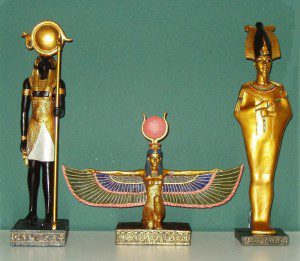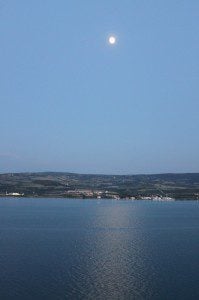 I spent yesterday working on a post about how the success of my “themes not goals” approach means I’m now setting goals for 2014. But before I could finish it there was a rash of posts on polytheistic theology and I feel the need to respond.
I spent yesterday working on a post about how the success of my “themes not goals” approach means I’m now setting goals for 2014. But before I could finish it there was a rash of posts on polytheistic theology and I feel the need to respond.
Much of this discussion is contentious and some of it has become personal. If you want to catch up, read this post by Morpheus Ravenna, this one by Rhyd Wildermuth, this one by Alison Lilly, this one by Traci Laird, this one by Anomalous Thracian, and this most recent one by Morpheus Ravenna. There have been others I didn’t link to and more are coming. It’s all thought-provoking reading if you’ve got a couple hours.
I consider all these people friends to one extent or another. I’m sorry things have gotten personal, but it’s good that we’re having this debate. Paganism is still a new religion and we’re still trying to figure out our theology… or more properly, our theologies. Better that we work through this with mass participation on the internet than 300 bishops (out of an invited 1800) holed up somewhere deciding what will become orthodoxy for the next two millennia.
What follows is my take on the subject.
There are many views on the nature and substance of the Gods. Which view is right? All we can say with absolute certainty is “we don’t know.” And that means the only thing that’s objectively wrong – the only thing that will make me stand on the table and scream “no that’s not right!” – is not leaving room for mystery.
By mystery here I mean uncertainty, not the subjective knowledge that comes through mystical experiences… though any religion that doesn’t leave room for that kind of mystery is unhelpful to me even if it isn’t objectively wrong.
This is Rule One of theology – We Don’t Know. There is no Rule Two. That doesn’t mean theology is useless and it doesn’t mean all answers are equally helpful. It means the practice of theology requires humility and openness… and a good dose of curiosity helps.
What’s subjectively wrong (i.e. – I’m convinced it’s not right, but see Rule One above) is trying to force the Gods into a naturalistic model that assumes the Gods of our ancestors cannot exist as real, distinct, individual beings. It seems like every time I discuss my dealings with the Gods – especially when They want me to do something – someone responds with “but you know that’s all in your head, right?” Or “but the Gods are myths and metaphors.” Or “you’re anthropomorphicizing something that isn’t human!”
Those are all valid theories and I respect them even though I don’t agree with them. What I find troubling is the underlying notion that since Science (the arbiter of reality in contemporary Western society) has no explanation for Gods as real, distinct, individual beings, They cannot exist, and to think They do is at best self-delusion. I find it ironic that some of the same folks who criticize hard polytheists for dealing with the Gods in a human fashion buy into the idea (subconsciously if not mindfully) that the currently popular human worldview is unquestionably correct: that if we humans don’t have all the answers, at least we have the One True Way to find all the answers.
(I’m an engineer. I love science. It’s brought us amazing discoveries and greatly improved our standards of living. It’s also brought us nuclear waste, chemical weapons and fracking. Science is a great tool, a lousy philosophy and a harmful religion.)
 Do you worship Poseidon or do you worship The Sea? In the distance I hear Poseidon roaring like Davy Jones in Pirates of the Caribbean: “I AM THE SEA!” Perhaps. But Poseidon has one history, one set of stories, one personality. The Sea has another. Poseidon hears prayers and accepts offerings – or not, as He sees fit. The Sea simply is.
Do you worship Poseidon or do you worship The Sea? In the distance I hear Poseidon roaring like Davy Jones in Pirates of the Caribbean: “I AM THE SEA!” Perhaps. But Poseidon has one history, one set of stories, one personality. The Sea has another. Poseidon hears prayers and accepts offerings – or not, as He sees fit. The Sea simply is.
Both are beautiful and powerful and I stand in awe of both. It seems reasonable to me to worship both. But because Poseidon has human-like qualities (which is NOT the same thing as believing “the Gods are just like humans only bigger”) I can relate to him very differently from how I can relate to The Sea. A religion based on mutually beneficial relationships with Deities with human-like qualities will of necessity look and feel very different from a religion based on mutually beneficial relationships with the Natural world. But there is clearly room for both in the Big Tent of Paganism, as well as room for both in the corner of polytheism.
There seems to be a needless argument about what constitutes a polytheist. A polytheist is someone who acknowledges multiple Gods. I see no need to refine that further. If you say “I’m a polytheist: I worship The Land, The Sky and The Sea” then I have no argument with you even though your approach is not enough for me.
Alison Lilly complains that some people accuse her of atheism for having such an approach. I think her complaint is valid. There is historical precedent for this view – some accused the early Christians of atheism because they denied the reality of the Greco-Roman Gods. But that view was wrong then and it’s still wrong now. Atheism is the denial of all gods, not the denial of your gods.
Enough with the nuances and uncertainties of polytheism. Here’s what I believe.
I believe the Gods are real, distinct, individual beings because that’s how I’ve experienced Them. My experience of Isis is different from my experience of Cernunnos is different from my experience of Morrigan and so on. And all of those experiences are different from my experience of my own thoughts and feelings.
The more I work with the Gods as individuals – the more I pray, worship, meditate, make offerings and especially the more I listen to Them – the more Their reality is evident to me and the more meaningful my life becomes. The subjective knowledge I gain far outweighs my lack of objective knowledge.
What of those who take a psychological view of the Gods, or a metaphorical view, or a naturalistic view? I’m a Unitarian Universalist as well as a Pagan and a Druid – I’ll judge your beliefs based on how well they motivate you to live a meaningful, compassionate and helpful life, not on how well they match up with my beliefs. But the fact that your beliefs are helpful to you doesn’t mean I find your arguments persuasive.
The idea I’ve seen emphasized in all the recent posts is that the Gods have agency. They have Their own thoughts, Their own ideas, Their own will, and perhaps most importantly, Their own interests and areas of responsibility. This is important. The idea that the Gods are here “for us” – whether as therapists or coaches or divine helicopter parents – is decidedly unhelpful. Yes, the Gods sometimes call a human into Their service – I’ve experienced such a call. But my priesthood isn’t about me – it’s about Them. It’s about conveying Their messages and doing Their work.
Honoring the Gods as real, distinct, individual beings reminds me that ultimately, life isn’t all about me. There is something bigger, stronger, and wiser and my life is better when I stay connected to that something – to Them. My life is better when I model Their values and emulate Their virtues. Though I am ultimately responsible for my own life, I do a better job of serving the Greater Good when I work with Them.
I have to wonder if perhaps this flurry of polytheological blog posts isn’t simply a case of Deity-centered Pagans and Nature-centered Pagans misunderstanding each other. My hope is that the exchange has informed and enlightened all, and that our understanding of the Gods and of each other has grown.
Now if you’ll excuse me, it’s time for evening prayers.













